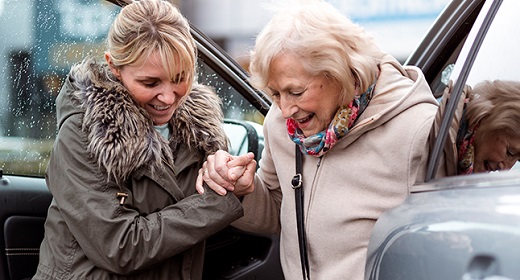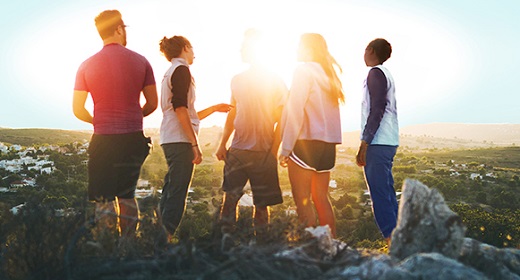by Sara Schairer: “Be nice.”“Be kind.”“ Treat others how you wish to be treated…”
You’ve probably heard those brief directives since you were born, or at least by the time you got to school. Have you paid attention to how you feel when you’re kind to others? You may have noticed something remarkable that happens—when you’re kind, others tend to treat you well in return.
What is kindness? When you act without expecting anything in return. But whether you’re smiling at a stranger, asking a friend how their stressful day went, volunteering for a charity, or offering to take care of your neighbors’ cats while they’re on vacation, kindness does more than help the other. There’s a good chance that you feel a positive boost each time you offer kindness to someone.
The Science of Happiness
The science of happiness offers some validity to all of those parental, societal, and ancient teachings of kindness. In academia, the fields of mindfulness, compassion, and empathy research continue to gain momentum. In 2019, San Diego philanthropist Denny Sanford donated $100 million to the University of California, San Diego toward empathy and compassion research and toward the cultivation of compassion in healthcare.
There is a mountain of research that exists around qualities like kindness, compassion, and empathy, and it can be tough to wade through all of that information. So, here are highlights of some of the most compelling and interesting science that answer the question: Why is kindness important?
1. Kindness Helps Humans Survive
When you hear the name Charles Darwin, what comes to mind? Does “survival of the fittest” ring a bell? You may know that Darwin theorized that the strongest and fastest beings survived and passed along their genes while the weakest died off.
What you may not realize, however, is that Darwin wrote a heck of a lot about what he called “sympathy.” He believed that the ability to care for each other is a vital part of survival for mammals. It makes sense, doesn’t it? If your ancestors didn’t care for their children, the children wouldn’t survive. Therefore, you wouldn’t be here.
More recent research on humans indicates that kindness “wins.” Dacher Keltner, Ph.D., of the University of California, Berkeley’s Greater Good Science Center studied groups of children and young adults. Writing about what he found in Born to Be Good: The Science of a Meaningful Life, he shared that it wasn’t “domineering, muscle-flexing, fear-inspiring, backstabbing types” that rose to the top of social status among their peers. Instead, those who were socially intelligent advanced to the top of the social ladder.
According to Keltner, “It is the young adults and children who brim with social energy; who bring people together who can tell a good joke . . . or soothe another in distress who end up at the top.”
2. You’ve Got Some Nerve
You are born to be kind. Science indicates that human beings are hardwired to care for others. In fact, humans share that hardwiring with all mammals.
Mammals have a bundle of nerves, referred to as the vagus nerve, that wind their way from the top of the spinal cord and down through the torso. It’s connected to facial and vocalization muscles, the heart, lungs, kidney, liver, and digestive organs. The vagus nerve is responsible for the way you turn your face toward someone in need, the facial expressions you make that indicate empathy and the sounds you emit to show that you care.
The vagus nerve slows down the heart rate in order to help you stay calm, gentle, and ready to care. Researchers believe the vagus nerve also connects to our oxytocin receptors. Oxytocin is deemed the “feel-good hormone,” and when it’s released you may notice feelings of warmth, trust, and connectedness.
3. Physical Health
Turns out you may live longer if you’re kind. A research study looked at the correlation between mortality rates and volunteering. They followed 2,025 elderly residents of Marin County, California, and categorized them based on their levels of volunteerism.
Over five years, researchers found that 23.8 percent of the male study participants and 21.1 percent of the female participants died. Interestingly, though, the data show that volunteering for more than one organization greatly impacted death rates. Researchers found that people who volunteered for two or more organizations lowered their chances of dying by 63 percent compared to those who didn’t volunteer.
You may think exercising, attending religious services, or being a non-smoker would have a bigger impact on mortality. The study indicated otherwise, however.
“High volunteerism, however, remained significantly associated with lower mortality rates . . . The 44 percent reduction in mortality associated with high volunteerism in this study was larger than the reductions associated with physical mobility (39 percent), exercising four times weekly (30 percent), and weekly attendance at religious services (29 percent), and was only slightly smaller than the reduction associated with not smoking (49 percent).”
One way to explain the increased longevity may be the “helper’s high.” A study of volunteers examined physical sensations that accompany volunteering and helping others. According to a white paper on the effects of kindness: “Two thirds of helpers report a distinct physical sensation associated with helping; about half report that they experienced a ‘high’ feeling, whereas 43% felt stronger and more energetic, 28% felt warm, 22% felt calmer and less depressed, 21% experienced greater self-worth, and 13% experienced fewer aches and pains.”
4. It Pays to Be Kind
Individuals aren’t the only ones who reap rewards from kindness. You may have noticed your inclination to purchase eco-friendly products if given the option; you are not alone. Data suggest that companies and brands also benefit when they make kindness a priority.
A March 2019 report out of New York University’s Stern Center for Sustainable Business concludes that “products marketed as sustainable are driving product and category growth.” In fact, products that were marketed as “sustainable” grew 5.6 times faster than products that weren’t so deemed.
Of course, kind customer service will cultivate customer loyalty, which, in turn, creates a more profitable business. The science of kindness includes a study written about in Harvard Business Review. The HBR article states that “customers who had the best past experiences spend 140% more compared to those who had the poorest past experience.”
5. It Feels Good
A 2003 study shows a link between volunteering and mental health. Scientists surveyed over 2,000 members of the Presbyterian Church to assess a link between depression and volunteering. What they found was “helping others is associated with higher levels of mental health, above and beyond the benefits of receiving help.”
Research also suggests kindness correlates to a greater level of happiness and enhanced well-being.
It’s not only adults who feel happier when they’re giving to others. If you’ve got a grumpy toddler on your hands, perhaps you can turn that frown upside down by encouraging them to be kind. A 2012 study looked at how giving affected the emotions of toddlers. The toddlers were given treats (like graham crackers) and were asked to give one of their treats to a puppet. The toddlers exhibited greater happiness when they gave away a treat compared to receiving a treat.
6. Self-Compassion Is Key
Kindness and compassion toward other people helps them and it helps you. There’s also a great deal of research suggesting that it also pays to offer kindness toward yourself.
If you’re like many, you are your harshest critic. Thank goodness for self-compassion. If you want to be resilient and learn from your mistakes, research shows that you need to usher in some self-kindness and self-encouragement.
Self-compassion is made up of three main pillars, according to Kristin Neff, Ph.D., the main researcher of self-compassion: mindfulness, common humanity, and self-kindness.
According to a 2012 study, self-compassion can be linked to having more motivation to change for the better, wanting to try harder to learn, and learning from the past in order to avoid making the same mistakes. Self-compassion has also been linked to a decreased fear of failure.
7. There’s a Ripple Effect
Have you ever had the lucky opportunity to be on the receiving (and giving) end when there’s a pay-it-forward contagion happening at a coffee shop? If so, the person before you purchased your cup of coffee, and then you felt moved and purchased coffee for the person behind you.
Perhaps you’ve witnessed someone in the car in front of you roll down their window and give water to a person who is homeless. Did that inspire you to bring more kindness into your day?
Research suggests that kindness is contagious, so the “ripple effect” is more than just a nice idea. Studies out of Stanford and Harvard examined how prosocial behavior might affect others. One study looked at what happens when participants observe either generous giving or stingy giving. Would they turn around and be generous or stingy based on what they observed?
Another study looked to see the effects of participants who observed someone offering a generous charitable donation. Would the participants then perform a completely unrelated prosocial behavior by writing supportive notes to other participants? What researchers found was that witnessing prosocial behaviors positively impacted behaviors of the observers.
8. Kindness Is Attractive
How much time and money do you spend on looking good? It’s a worthy endeavor, for sure, to be your best, healthy self. But, if you’re looking to attract a mate, investing in kindness might provide you more bang for your buck (and it doesn’t even cost a buck)!
According to research on human mate preferences, kindness is key. Researchers asked over 10,000 people from 33 countries to rank preferences in a potential mate, and “kind-understanding” ranked higher than physical attractiveness and earning power.
In a world facing atrocities like raging rainforest fires, mass shootings, and rising numbers of displaced people, you might feel like your random acts of kindness won’t matter. Thanks to this growing body of research on kindness, you can feel good knowing that what you do just might be creating a positive ripple that makes the world better.





















































